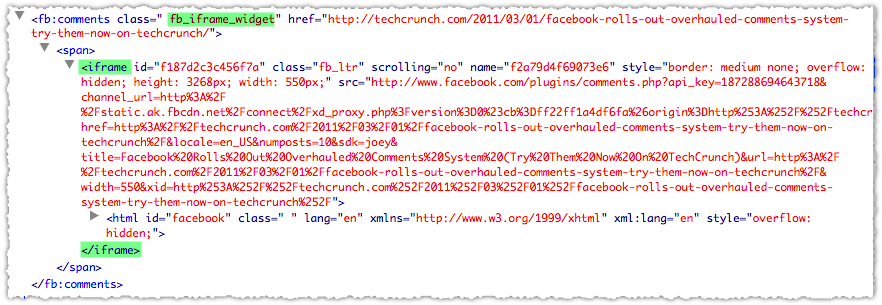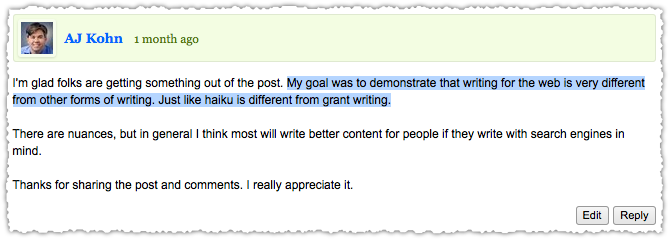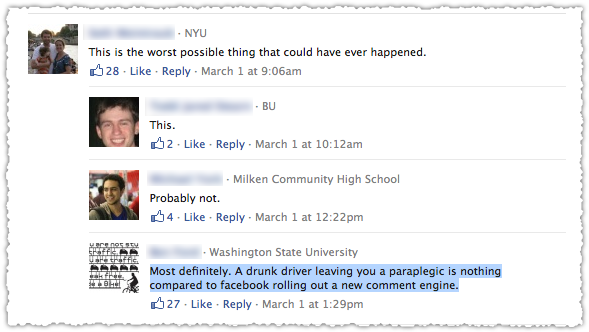You know those compressed movie barcodes that we saw last week? Here's a Python script by Benoît Romito to make your own. Run a .avi format movie through, and voila. Free gift idea: digitize some old home movies and make a personalized barcode for your family.
Archive for March, 2011
Six science selections
- How Radiation Threatens Health – Why and how does exposure to radiation make you ill? What levels of exposure are dangerous and what levels are lethal?
- Fukushima is a triumph for nuke power – Quake + tsunami = 1 minor radiation dose so far, says El Reg. Tragic as recent events in Japan have been. We should be building more nuclear reactors not fewer. Global warming caused by burning more and more fossil fuel in coming decades will have a far more detrimental effect on many more people than minor nuclear leaks.
- Dog walking ‘is good exercise’ – Owning a dog but not walking it is bad for the dog’s owner as well as the dog. NHS Choices unravels the spin on recent headlines proclaiming dog ownership good for health.
- Top banana – Atomic absorption spectroscopy is being used to assess how well banana peel can filter heavy metals, such as copper, from waste water. Preliminary results look promising and could lead to an ecologically sound method of industrial cleanup that uses a renewable but otherwise wasted source material.
- spectroscopynow.com/coi/cda/detail.cda?id=25080&type=Feature&chId=9&page=1″>Toxic robot – A new high-speed robotic screening system for chemical toxicity testing was recently unveiled by collaborating US federal agencies, including the National Institutes of Health. The system will screen some 10,000 different chemicals for putative toxicity in what represents the first phase of the "Tox21" program aimed at protecting human health and improving chemical testing.
- Crystal unknowns – Frank Leusen and his co-workers at the University of Bradford, England, have turned to a quantum mechanical approach to help them predict the three known possible polymorphic structures of a sulfonimide. The work could assist crystallographers in structure determination of unknowns
My latest selection of six science stories, picked up by David Bradley Science Writer @sciencebase.
Related Posts:
Six science selections is a post from: Sciencebase Science Blog
LIGO to Collaboration Members: There Is No Santa Claus
Ah, the life of an experimental physicist. Long hours of mind-bending labor, all in service of those few precious moments in which you glimpse one of Nature’s true secrets for the very first time. Followed by the moment when your bosses tell you it was all just a trick.
Not that you didn’t see it coming. As we know, the LIGO experiment and its friend the Virgo experiment are hot on the trail of gravitational waves. They haven’t found any yet, but given the current sensitivity, that’s not too much of a surprise. Advanced LIGO is moving forward, and when that is up and running the situation is expected to change.
But who knows? We could be surprised. It’s certainly necessary to comb through the data looking for signals, even if they’re not expected at this level of sensitivity.
Of course, there is something of a bias at work: scientists are human beings, and they want to find a signal, no matter how sincerely they may rhapsodize about the satisfaction of a solid null result. (Do the words “life on a meteorite†mean anything to you?) So, to keep themselves honest and make sure the data-analysis pipeline is working correctly, the LIGO collaboration does something sneaky: they inject false signals into the data. This is done by a select committee of higher-ups; the people actually analyzing the data don’t know whether a purported signal they identify is real, or fake. It’s their job to analyze things carefully and carry the whole process through, right up to the point where you have written a paper about your results. Only then is the truth revealed.
Yesterday kicked off the LIGO-Virgo collaboration meeting here in sunny Southern California. I had been hearing rumors that LIGO had found something, although everyone knew perfectly well that it might be fake — that doesn’t prevent the excitement from building up. Papers were ready to be submitted, and the supposed event even had a colorful name — “Big Dog.†(The source was located in Canis Major, if you must know.)
Steinn Sigurðsson broke the news, and there’s a great detailed post by Amber Stuver, a member of the collaboration. And the answer is: it was fake. Just a drill, folks, nothing to see here. That’s science for you.
When the real thing comes along, they’ll be ready. Can’t wait.
Copyright law meets synthetic life meets James Joyce
 Last year I wrote about how Craig Venter and his colleagues had inscribed a passage from James Joyce into the genome of a synthetic microbe. The line, “To live, to err, to fall, to triumph, to recreate life out of life,†was certainly apropos, but it was also ironic, since it is now being defaced as Venter’s microbes multiply and mutate.
Last year I wrote about how Craig Venter and his colleagues had inscribed a passage from James Joyce into the genome of a synthetic microbe. The line, “To live, to err, to fall, to triumph, to recreate life out of life,†was certainly apropos, but it was also ironic, since it is now being defaced as Venter’s microbes multiply and mutate.
Turns out there’s an even weirder twist on this story. Reporting from SXSW, David Ewalt writes about a talk Venter just gave. Venter recounted how, after the news of the synthetic microbe hit, he got a cease-and-desist letter from the Joyce estate. Apparently, the estate claimed he should have asked permission before copying the language. Venter claimed fair use.
Man, do I wish this would go to court! Imagine the legal arguments. I wonder what would happen if the court found in the Joyce estate’s favor. Would Venter have to pay for every time his microbes multiplied? Millions of little acts of copyright infringement?
Chinese provinces compared to countries
It's easy to forget just how big some countries are. For example, China:
China is now the world’s second-biggest economy, but some of its provinces by themselves would rank fairly high in the global league. Our map shows the nearest equivalent country. For example, Guangdong's GDP (at market exchange rates) is almost as big as Indonesia's; the output of both Jiangsu and Shandong exceeds Switzerland’s.
Select among GDP, GDP per person, population, and exports. There's a similar interactive for the United States.
[The Economist via Strange Maps | Thanks, Elise]
The Magical Bend
I have seen tons of elegant flatware but none of them as ingenious as this! The Magic Spoon is a delightful set of spoons, knives and forks that have built-in clasps at the end. Yes, exactly the hairpin kind! You can cleverly cling it to your plate while clearing out the dishes, seal pouches or simply be this show-off with cool cutlery!
Magic Spoon is a 2010 Kitchen Tools Winner!
Designer: Ivan Erkic







----------
Yanko Design
Timeless Designs - Explore wonderful concepts from around the world!
Yanko Design Store - We are about more than just concepts. See what's hot at the YD Store!










































































